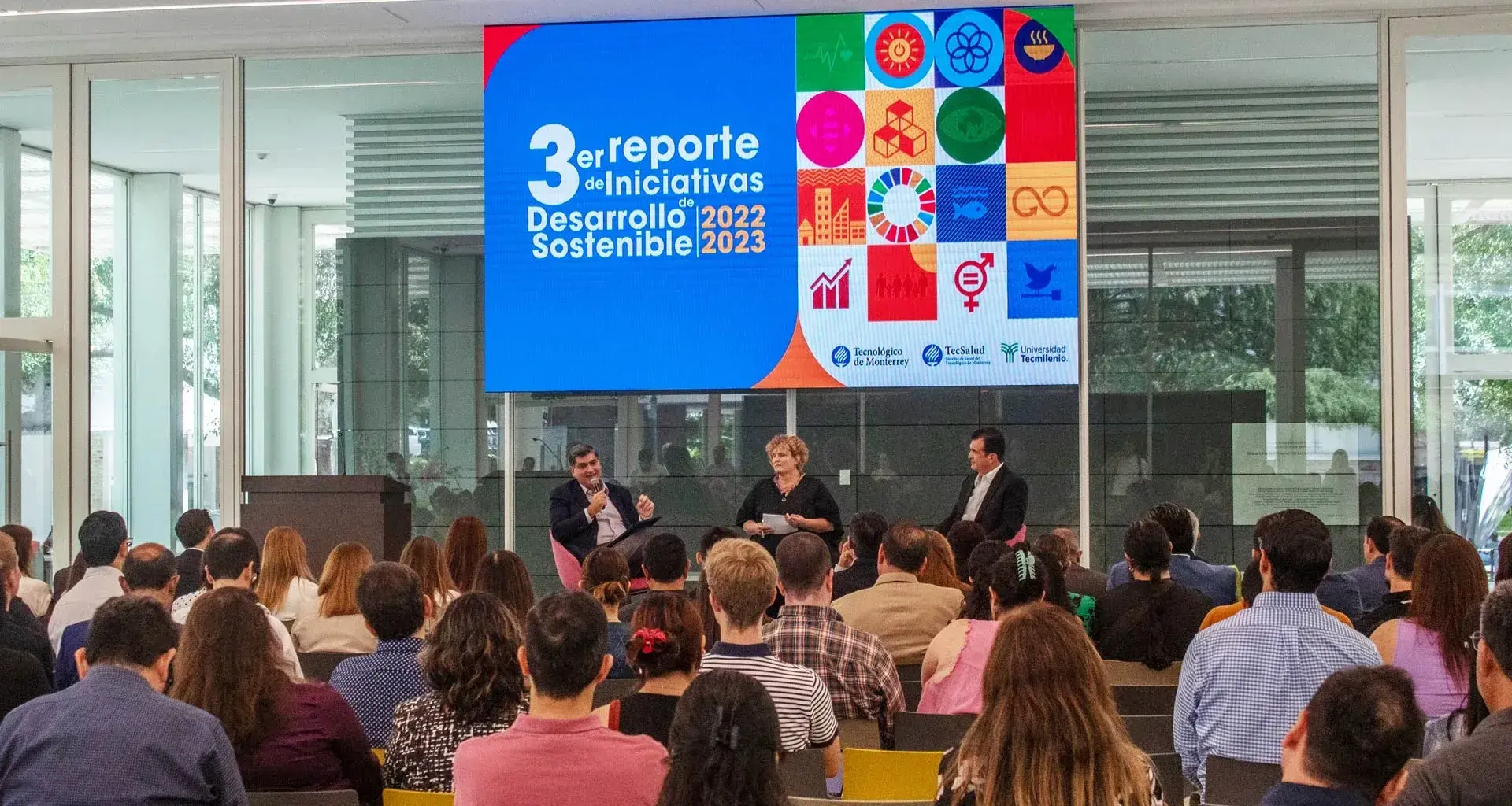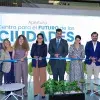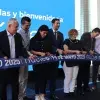Through 851 activities for sustainable development, Tec de Monterrey actively benefited more than 932,000 people in Mexico between 2022 and 2023.
During the presentation of its 3rd Report on Sustainable Development Initiatives, it indicated that these actions are aimed at meeting the 17 Sustainable Development Goals (SDGs) set out in the United Nations 2030 Agenda.
“Although the challenge that lies before us is considerable, we believe that we can pick up the pace to make progress on meeting the SDGs if different stakeholders and key sectors join forces,” said David Garza, Rector and Executive President of the Tec.
“It’s important to note that 83% of all participations came from students, 248 were led by faculty, and 57% were in partnership with external stakeholders,” added Paola Visconti, Outreach Manager for Ruta Azul.
The results were presented this August 28 during a ceremony at La Carreta on Monterrey campus, which was attended by directors and other members of the Tec community.
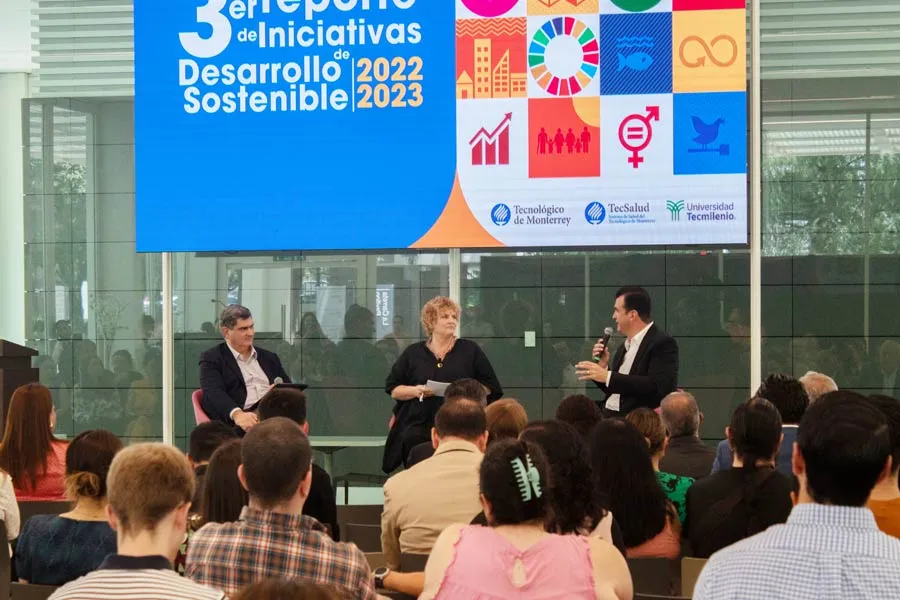
Discover nine substantial projects that serve the community
The Tec promotes and monitors nationwide initiatives to actively contribute to making progress on the SDGs for 2030 through projects with specific actions under each heading.
1. Prepanet (Digital Inclusion)
This initiative seeks to reduce inequality and educational gaps in Mexico through an online high school course taught to a high academic standard, with a flexible scheme aimed at adults and young people who cannot access the traditional model of education.
In the 2022-2023 period, Prepanet had an enrollment of 2,104 students and graduated 1,049 participants.
2. United for a Better Future (Materials and Communication for Quality Education)
This initiative provides online and in-person mentoring centered around four areas: personal, academic, labor, and civic participation, chiefly giving advice on middle school subjects.
The goal of this initiative is to reduce the incidence of problems in adolescence, such as vandalism, addictions, students dropping out of school, violence, and educational gaps.
This project has seven sub-programs: 1+1, Kids Camp, Languages, Human Development, Entrepreneurship, Transforming My Community, and Soccer Team, which impact 160 boys, girls, and adolescents.
3. Ruta Azul (Climate Action)
The Tec’s Sustainability and Climate Change Plan, known as Ruta Azul, is its internal strategy for converting the institution into a role model for sustainability and contributing to a sustainable future.
In 2022, it reduced greenhouse gas emissions by 47% compared to 2019, obtaining 74% of its energy from renewable sources.
Since February 2022, both of TecSalud’s San José and Zambrano Hellion hospitals have exclusively used renewable energy, advancing toward the goal of reducing emissions by 50% and achieving 80% consumption of renewable energy.
4. SOS Entrepreneurial SME Development Center (Entrepreneurship with Impact)
This initiative seeks to close the gap in digital skills development and access for Mexican small and medium-sized enterprises (SMEs), in order to bolster their businesses.
It therefore facilitates access to digital technologies for automating processes, offers training and mentoring from experts and Tec students, and provides consultancy on several aspects.
Between 2022 and 2023, this center taught 16 courses to 1,252 companies and financed 400 companies, which enabled the creation or conservation of more than 1,900 jobs.
5. Leaders of Tomorrow
The Leaders of Tomorrow scholarship program (LDM) enables the institution to incorporate highly talented and academically gifted students who are committed to transforming reality with 100% scholarships throughout their degree programs.
Aimed at young people from Mexico and Latin America, the program seeks to attract the best academic talent. LDM awarded 200 scholarships in the 2022-2023 period.
6. TecSalud Integrated Health Center (Good Health and Wellbeing)
TecSalud Foundation’s Integrated Health Center provides accessible medical attention to communities in Nuevo León, standing out due to its quality, excellence, and humane focus throughout the process.
As well as offering medical services, the Center operates as an academic space for Tec de Monterrey’s medical and student community.
Between 2022 and 2023, the center had 74 residents and 72 volunteer medics, performing 50,728 consultations, 24,429 laboratory and X-ray studies, 804 mammograms, 3,535 surgeries, 426 procedures, and 3,131 psychotherapy sessions.
7. Design for Vulnerables (Accessible and Sustainable Spaces)
The initiative consists of 5 hubs where Architecture, Art, and Design students performed interventions such as an environmental laboratory, composting, and the installation of a solar panel and drinking water filters in public spaces.
What’s more, the project includes participative design in the communities of Nuevas Delicias, Julimes, and Paso del Norte in Chihuahua.
Participative design and research projects were implemented in the period reported, transforming 1,200 square meters of gardens, two parks, and nine academic and educational spaces in this state.
8. Institute of Advanced Materials (Research with Impact)
This institute focuses on contributing to a carbon-neutral economy through research, technological development, and entrepreneurship in sustainable manufacturing processes and materials.
Since its inception in 2022, this initiative has designed hi-tech fabrication processes to accelerate and scale up the production of advanced materials with minimal environmental impact.
To date, it has achieved 1,872 academic publications, 105 published books, 123 coordinated books, 24 implemented projects, and 7 patents.
9. Collections for hurricane victims (Humanitarian Action)
The Tec community came together to support people affected by Hurricane Otis in Guerrero, managing to donate 5,446 community donations.
Student groups from Hidalgo campus (Centro de Acopio Acapulco) and State of Mexico campus (Corderos Imperiales) contributed 27 blankets, 423 bags of groceries, and 15 kilograms of clothing.
Tecmilenio also took part through the Colecta OTIS and Apoyemos a Acapulco initiatives, which collected 100 toys and 4,181 kilograms of food.
Broad scope efforts with a multi-axis perspective
Of the 851 initiatives presented in the report, 657 were from the Tec, 190 from Tecmilenio, and 4 from TecSalud, benefiting the Mexican population in key points such as Internet access, educational courses, accessible health services, and humane spaces.
Projects with a focus on the SDGs were as follows:
- Quality Education, with 211 initiatives;
- Good Health and Wellbeing, with 89;
- Responsible Production and Consumption, with 68; and
- Reduced Inequalities, with 66.
Nine categories of indicators were used to measure the impact of the results, of which the most outstanding was the category of Materials and Communication for Quality Education (with 286 active projects), followed by Academic Research (with 143) and Environment (with 144).
Around 50% of the initiatives centered on offering quality educational resources, providing more than 86,000 courses and 400 scholarships, while encouraging digital inclusion, facilitating the digital inclusion of more than 15,000 people.
- SDG initiatives
- No Poverty – 23 initiatives
- Zero Hunger – 54 initiatives
- Good Health and Wellbeing – 89 initiatives
- Quality Education – 211 initiatives
- Gender Equality – 45 initiatives
- Clean Water and Sanitation – 30 initiatives
- Affordable and Clean Energy – 13 initiatives
- Decent Work and Economic Growth – 52 initiatives
- Industry, Innovation, and Infrastructure – 30 initiatives
- Reduced Inequalities – 66 initiatives
- Sustainable Cities and Communities – 48 initiatives
- Responsible Production and Consumption – 68 initiatives
- Climate Action – 50 initiatives
- Life Below Water – 4 initiatives
- Life on Land – 21 initiatives
- Peace, Justice, and Strong Institutions – 21 initiatives
- Partnerships for the Goals – 26 initiatives
This year, the results were grouped into nine categories, with the School of Government and Public Transformation and the Institute for the Future of Education collaborating on this process of quantitative measurement:
- Materials and Communication for Quality Education– 334 initiatives
- Research with Impact– 147 initiatives
- Climate Action– 144 initiatives
- Humanitarian Action– 139 initiatives
- Entrepreneurship with Impact– 89 initiatives
- Accessible and Sustainable Spaces– 56 initiatives
- Digital Inclusion– 34 initiatives
- Good Health and Wellbeing– 28 initiatives
- Social Mobility– 7 initiatives
“We can pick up the pace to make progress on meeting the SDGs if different stakeholders and key sectors join forces.”- David Garza
I
Digital Inclusion and strategic partnerships lead the 2030 strategy
A panel on digital inclusion was held during the presentation, which included the participation of Rector David Garza and Carlos Bejos, National Director of Digital Inclusion.
According to Garza, the main issue to be addressed is the fact that there are still around 20 million people in Mexico who do not have Internet access.
“It’s a very different story in terms of growth and opportunities for those who have Internet access and those who don’t, as well as its offshoots such as artificial intelligence,” he remarked.
Bejos mentioned three major areas of the Tec’s strategy to reduce the digital divide in the country: Internet access, digital literacy, and multi-sector partnerships.
“We’re committed to impacting 400,000 people by 2025, and we’re now up to around 350,000,” explained Garza.
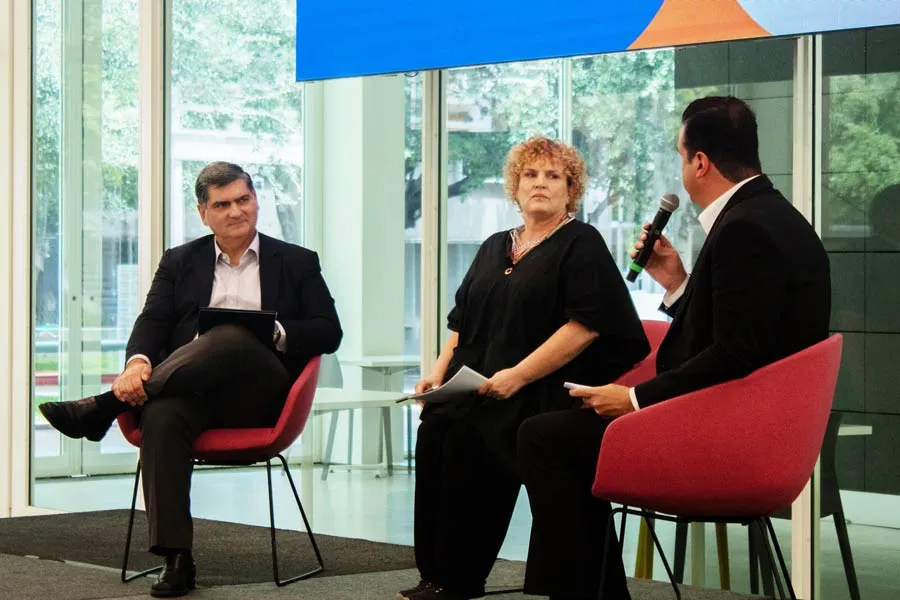
“The findings from this report won’t stay in this room; they’ll go much further,” stressed Inés Sáenz, Vice President of Inclusion, Social Impact, and Sustainability at the Tec, who was moderating this panel.
“Technology can become a factor for discrimination that generates other social, economic, labor, and educational gaps,” she added.
One of the noteworthy projects within this strategy was the installation of solar community hubs aimed at academic studies and vocational training with a solar-powered Internet connection.
“Multi-stakeholder partnerships are the basis of what the Tec does; they’re a very big strength that we have to make visible, as everyone is responsible for sustainable development,” concluded Inés.
YOU MIGHT ALSO BE INTERESTED IN:

